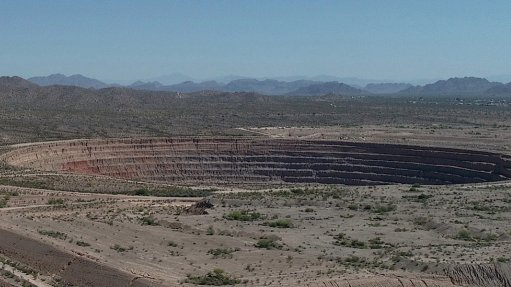Exploration trailblazer Orion cracks retail investor code with 14 000-plus SA backers

Orion Minerals CEO Errol Smart interviewed by Mining Weekly’s Martin Creamer. Video: Darlene Creamer.
JOHANNESBURG (miningweekly.com) – More than 14 000 South Africans now own shares in the discovery and development mining company Orion Minerals, which is reflective of retail investment that can be stimulated in South Africa to support essential local minerals exploration.
What is also extremely promising is that the dual listed Orion is trading a much higher volume of shares on South Africa’s JSE than on Australia’s ASX.
In the year to date, Orion has traded more than 600-million shares on the JSE and in the same period, 450-million shares on the ASX.
With only around 23% of Orion stock on the JSE, the local bourse has traded much higher volumes on a pro-rota stock listing basis than the more exploration-celebrated ASX.
“It shows that there is appetite in the South African market. It’s absolutely astounding that over 14 000 South Africans now own shares in Orion, from sizeable chunks down to small little bits and pieces,” Orion CEO Errol Smart said in a Zoom interview with Mining Weekly. (Also watch attached Creamer Media video.)
There is thus retail gusto for local exploration investment portfolios and, moreover, it is cheaper to trade stock on the JSE than it is to trade stock on the ASX, with trading a block of shares on the JSE a mere fraction of the price of trading a share block on the ASX.
“It’s cost-effective and the average individual and middle-income earners can go to their bank manager down the road in Prieska town and request that R2 000 worth of Orion shares are bought, and it isn’t cost prohibitive to do that,” said Smart.
“The JSE provides a very useful platform for that level of trading. I wish we could convince more fund managers and wealth managers to be advising their clients to invest in exploration.
“Unfortunately, it is a high-risk portfolio and it isn’t suitable for everyone and I definitely wouldn’t ask any granny and grandpa to put their money into the exploration game.
“But it is a very important small portion of a portfolio because it has got that opportunity to give multiples of return, unlike many other investments that give a 10% or 12% yield.
“An investment in an exploration stock is something that gives you hundreds of percent, if it works,” he added.
AUSTRALIAN PENSION FUND INVESTMENT
At the Australian end, one of Australia’s pension funds, a construction pension fund, has invested in Orion.
“They’ve taken the decision that they can bring in their competent people to do an evaluation and they invest on that basis. But it’s a small chunk of their money. It’s a minuscule fraction of a per cent of the money that they invest every year, but for Orion, it makes all the impact.
“That’s what happens in Australia. You’ve got these monster pension funds and each one of them invests half a per cent. When they hit the jackpot, that jackpot gives them a yield of multiple per cents. The reality is that in exploration, very many failures occur. They have to be more selective. It’s harder work and they have to decide on whether there is a return on investment for the fund manager.
“That’s what we need to see here in South Africa. The fund managers must decide whether there is a suitable return on investment and whether they should invest their time and energy to get the competent advice so that they know that they are making good investment decisions,” said Smart.
Mining Weekly: How have you managed to attract such a large number of retail investors on the JSE?
Smart: Largely it’s because we fill a gap. There isn’t anyone else that provides an exploration development investment opportunity for base metals in South Africa. We simply have a first-mover advantage. It is a dual listing and our primary listing is the Australian Stock Exchange so we’re predominately regulated by the ASX, although we have to keep to the JSE rules as well. Although most of our money, since the 2017 JSE listing, has actually come from Australia and Europe, a little bit of money has come from South Africa and it’s a growing amount. Every time that we do a placement, there’s a growing volume that actually gets taken up by South Africans. But we’re seeing more and more that South Africans are going to their wealth managers and their bank managers and saying, listen, I’ve heard about this company called Orion. Please buy me a couple of thousand rands worth of shares.
Mining Weekly: What more can be done to encourage junior mining in general and to get more of the Orion-type companies on to the JSE?
Smart: It’s a well-known and sad fact that our regulatory circumstances in South Africa are just not conducive to junior mining. It just takes too long to acquire a prospecting right and then too long to trade it and to get a Section 11 approval when you need to change ownerships. It’s not an investor-friendly circumstance. The big question on the management of minerals rights and mineral rights portfolios in South Africa, and this debate that has been ongoing for more than a year, very publicly now, is about the need for a mining cadastre and a set of solutions, which are all encompassed in a mining strategy document that we prepared for the Department of Mineral Resources and Energy (DMRE).
We came up with all sorts of solutions, including tax incentives that are non-erosive to South African Revenue Services. We made a presentation to National Treasury. It hasn’t gone any further. We need to re-ignite that. We need to get our mining title management in South Africa working properly and then we can get tradable shares in companies and then they can go to the JSE and other stock exchanges. But you’ve got to get economies of scale to get trading on a stock exchange. The concept that you can go and raise a million rand on a stock exchange does not happen. Investors are not going to invest a million rand. You’ve got to give them a sizeable chunk investment.
It needs to be hundreds of millions of rands to make it worthwhile and perhaps that is also what Orion brought to the JSE – an exploration company with some scale to it. Where we are trading at the moment, one-and-a-half billion rand, we could be trading at much higher value, but when we first came to market it was small but at a still-sizeable market cap of about R400-million that we came to the JSE with. But I think if was any less than that, we wouldn’t have got any attention. In fact, we didn’t get much attention for the first year.
Mining Weekly: To make it worthwhile to list, how much money needs to be raised when listing?
Smart: The actual cost that you pay to the stock exchange is a relatively small number. But to do all the compliance and to be audited by a tier-one or tier-two auditor and to keep all your King compliance almost requires one or two expensive executives to be employed on your payroll, just to look after compliance. That’s right in a number of ways because without compliance, you can’t make a company generally investable on a stock exchange. The JSE ensures that you are compliant with the rules of the game and that is a protection mechanism that’s put in place. But as a result, you get an economy of scale and I don’t think anyone should list on the JSE if they are going to have a market cap of less than R300-million to R400-million.
They also have to have the expectation that they will need to raise capital in the order of a billion rand within a two- to five-year timeframe. Without that, they are just never going to get traction, and it’s just not cost-effective. I took a public company from Australia and came to the Johannesburg Stock Exchange with a South African portfolio of assets and it’s partially worked for us. Every CEO of a listed company in the world likes to see higher value and the South African discount that we all have to deal with is unpleasant. We need to overcome this whole South African discount concept.
We beat on the DMRE. People like to beat on the JSE. Well, I’d like to beat on the fund managers and the wealth managers because if this was something they want to be invested in, they should stop beating on Minerals Council South Africa and the JSE and start beating on the financial services to be allowed to advise individuals to invest in exploration stocks. At the moment it’s not within their mandate because the risk profile isn’t appropriate for every investor and that means that the wealth managers and the fund managers have to make a decision. But the wealth managers and the fund managers have all gone and fired all the analysts so they haven’t got technically competent people to advise them on whether it’s a good investment or not. What they do is they just throw their hands up and say they are not going to advise anybody to buy into this because they don’t understand it adequately to advise their clients.
That’s where the problem is. We’ve got to the bottom of what makes people invest, making sure that there is compliance so that there is a level of protection, and that they’ve got proper technical advice on the investability of the asset. There are many levels that we’ve got to deal with and not all of them come from mining itself. Many come from our financial services sector and our tax structures in South Africa, which are not as attractive as internationally. Very few foreigners come and invest in us on the JSE. It’s South Africans that trade on the JSE. It’s not foreigners that trade on the JSE.
Mining Weekly: Should exploration professionals be listed?
Smart: A lot of them should. I look at my peers and my colleagues that I see in Minerals Council South Africa because of my role as chair of the junior leadership forum. I see a lot of these people and a lot of them have got fantastic assets. There’s probably a little bit less experience than what you would have with the equivalent company in Australia or in Canada because there are so many of them. There are 700-odd in Australia and thousands in Canada. The people have got more experience in dealing with public markets and that experience isn't awash here in South Africa but it can be grown. It’s like anything else, you can learn it. There are very good projects here and they deserve to be listed – and they can attract capital. But people mustn’t think it’s a universal panacea. Believe me, it’s extremely hard work dealing with the investment public because every step you take is in the glare of the public headlights. There’s nothing that’s not seen. But it does bring you access to capital and every access to capital comes at a cost.
Mining Weekly: What sort of institutional investors should invest in exploration?
South Africa’s Public Investment Corporation (PIC), for instance, wouldn’t invest in exploration. But would half a per cent of PIC money have a negative impact on the pension fund members outcome? I doubt it. If they get proper technically competent people to advise them, they can make good investments. Internationally that’s what happens.
Mining Weekly: Do we need a return of the stock broker to get things going?
I think that the brokers did play a very important role and I think the industry is worse off for not having them because they are market makers. The loss of the brokers hasn’t been to the benefit of the industry.
Mining Weekly: Can the exploration market be grown because if it doesn't grow, mining will end?
I think it can be grown. I think it’s extremely frustrating at the moment. Minerals Council South Africa has put in so much energy in negotiating with the DMRE, approaching Treasury on all sorts of things. We get criticised all the time because we do try to do this in an orderly manner and not in the public forum all the time because we want to work in a synergistic way. Our regulators, and I’m not just speaking about the DMRE, but our regulators across the board, have to come to the table. Unless you stimulate the pipeline that feeds mining and unless you are discovering minerals that are going to be mined in the future, and unless you are getting the investment into the discovery of minerals, mining will die. With exploration, the investment is immediately spent. That’s the whole thing about exploration. An investor puts money into an exploration company and if it’s a proper exploration company that is following the regulations, they spend all of that money on adding value. They spend money on drilling, assaying samples, doing engineering and environmental studies and social programmes. All the explorers that are successful and are alive in South Africa are doing social investment, even though they are not obligated to do so in terms of the Mining Charter. Exploration is a way of unlocking the value chain, and if it isn’t unlocked, that whole machine is going to grind to halt.
Article Enquiry
Email Article
Save Article
Feedback
To advertise email advertising@creamermedia.co.za or click here
Press Office
Announcements
What's On
Subscribe to improve your user experience...
Option 1 (equivalent of R125 a month):
Receive a weekly copy of Creamer Media's Engineering News & Mining Weekly magazine
(print copy for those in South Africa and e-magazine for those outside of South Africa)
Receive daily email newsletters
Access to full search results
Access archive of magazine back copies
Access to Projects in Progress
Access to ONE Research Report of your choice in PDF format
Option 2 (equivalent of R375 a month):
All benefits from Option 1
PLUS
Access to Creamer Media's Research Channel Africa for ALL Research Reports, in PDF format, on various industrial and mining sectors
including Electricity; Water; Energy Transition; Hydrogen; Roads, Rail and Ports; Coal; Gold; Platinum; Battery Metals; etc.
Already a subscriber?
Forgotten your password?
Receive weekly copy of Creamer Media's Engineering News & Mining Weekly magazine (print copy for those in South Africa and e-magazine for those outside of South Africa)
➕
Recieve daily email newsletters
➕
Access to full search results
➕
Access archive of magazine back copies
➕
Access to Projects in Progress
➕
Access to ONE Research Report of your choice in PDF format
RESEARCH CHANNEL AFRICA
R4500 (equivalent of R375 a month)
SUBSCRIBEAll benefits from Option 1
➕
Access to Creamer Media's Research Channel Africa for ALL Research Reports on various industrial and mining sectors, in PDF format, including on:
Electricity
➕
Water
➕
Energy Transition
➕
Hydrogen
➕
Roads, Rail and Ports
➕
Coal
➕
Gold
➕
Platinum
➕
Battery Metals
➕
etc.
Receive all benefits from Option 1 or Option 2 delivered to numerous people at your company
➕
Multiple User names and Passwords for simultaneous log-ins
➕
Intranet integration access to all in your organisation



















